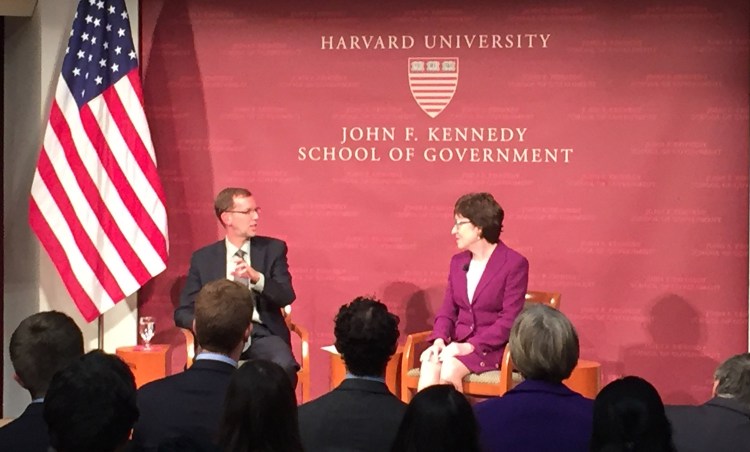Sen. Susan Collins explained Thursday why she won’t be voting for either Hillary Clinton or Donald Trump, said Congress is a reflection of the nation’s polarization, and offered some advice to whomever wins the presidency on how to get along with lawmakers of both parties.
Collins made her remarks during the John F. Kennedy forum put on Thursday night by Harvard University’s Institute of Politics. Collins, a moderate, was invited to speak at the school’s signature event by Harvard University President Drew Gilpin Faust.
“(Sen. Collins) improves the lives of her constituents and her fellow American citizens by working with colleagues of diverse political persuasions,” Faust said. “It’s a commitment that has sparked praise throughout her career.”
The Republican senator responded to questions posed by moderator Dr. Douglas Elmendorf, dean of the John F. Kennedy School of Government, as well as from the audience.
One woman in the audience asked why Collins wouldn’t vote for Clinton, saying that any vote cast for a candidate other than Clinton would equate to a vote for Trump. Collins has said that she will not be voting for either candidate.
Collins said she respected Clinton’s work on behalf of children and families, but was troubled by the controversy over Clinton’s use of a private email server for handling classified government information while she was secretary of state. Collins said she was also troubled by Clinton’s statement that she was exonerated by the head of the FBI, James Comey.
“He did not say that. He said she was extremely careless in her handling of classified emails,” Collins said.
Despite her concerns, Collins assured the audience she could work with Clinton. Clinton and Collins both served in the Senate at one point. “If she is our next president, I will tell you, I will work well with her.”
Collins was less supportive of Trump, citing his criticism of a Mexican-American U.S. District Court Judge Gonzalo Curiel, who was presiding over a lawsuit against Trump University. In June, Trump claimed that Curiel was biased because of his Mexican heritage, although he was born in Indiana. Trump denied his accusations were racist.
“To me, that showed such disrespect for the role of our judiciary. I was very troubled by that,” Collins said.
Collins also said she was deeply disturbed by Trump’s criticism of the grieving parents of Army Capt. Humayun Khan, who was killed in Iraq. Collins said Trump’s “lack of empathy” for Gold Star parents upset her.
In August, Collins wrote an op-ed piece for the Washington Post that said, “I will not be voting for Donald Trump for president. This is not a decision I make lightly, for I am a lifelong Republican. But Donald Trump does not reflect historical Republican values nor the inclusive approach to governing that is critical to healing the divisions in our country.”
Collins also talked about her views on the country’s current political climate and how her political party’s positions have evolved over time. She predicted that the Republican party would return to the political center at some point.
“Our country is becoming more and more polarized, Congress reflects that polarization,” Collins said. “I would say to all of the young people who are here tonight that it’s incumbent upon you to help us rebuild that sense of community that has been a traditional American value since the founding of our country.”
Collins, who has dinner once a month with other female senators, offered advice to the newly elected president.
She suggested that Clinton or Trump invite House and Senate leaders to breakfast once a week and that political leaders from both parties have breakfast together once a week.
“I believe that bringing people together makes a difference,” Collins said. “It’s much harder to demonize people that you have broken bread with.”
Collins, who was elected to the Senate in 1997, credited former Sen. Margaret Chase Smith with serving as her role model. Smith, a Republican, first served as a U.S. representative and then as a senator from 1940 to 1973.
Collins said she met Smith in Washington when she was 18, a senior at Caribou High School. She talked with Smith alone for nearly two hours.
“When I left her office, I was so proud,” she said. “I felt that women could do anything.”
Send questions/comments to the editors.




Success. Please wait for the page to reload. If the page does not reload within 5 seconds, please refresh the page.
Enter your email and password to access comments.
Hi, to comment on stories you must . This profile is in addition to your subscription and website login.
Already have a commenting profile? .
Invalid username/password.
Please check your email to confirm and complete your registration.
Only subscribers are eligible to post comments. Please subscribe or login first for digital access. Here’s why.
Use the form below to reset your password. When you've submitted your account email, we will send an email with a reset code.